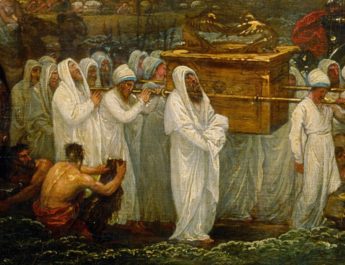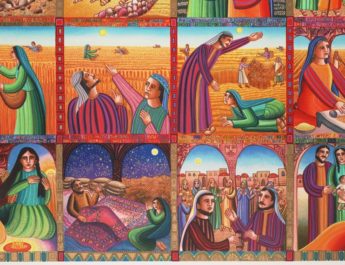1 Corinthians 6:12-20
Ordinary B8
12 “All things are lawfulA for me,” but not all things are beneficial.B “All things are lawful for me,” but I will not be dominatedC by anything.
A “are lawful” = exesti. From ek (out, out of) + eimi (to be, exist). This is what is permitted or what is allowed under the law. It can mean what is right, what holds moral authority, or, more broadly, something that is shown out in public.
B “are beneficial” = sumphero. 17x in NT. From sun (with, together with) + phero (to bear, bring, lead, make known publicly; to carry in a literal or figurative sense). This is to collect, bring together, or be profitable to. It is combining things such that there is gain or profit or advantage.
C “be dominated” = exousiazo. Related to “are lawful” in v12. 4x in NT. From exousia (power to act, weight; moral authority or influence; domain, liberty, freedom, capacity, mastery, right, force, or strength); from exesti (see note A above). This is have authority over, to control, wield power. It is power that is authorized.
13 “FoodD is meant for the stomachE and the stomach for food,” and GodF will destroyG both one and the other.
D “food” = broma. 17x in NT. From bibrosko (to eat); related to bora (food); perhaps from bosko (to feed or pasture a flock; figuratively, to nourish spiritually). This is any kind of food in a literal or figurative sense.
E “stomach” = koilia. From koilos (hollow). This is belly or organs in the abdomen. So, it could be stomach, womb, or heart. Figuratively, this refers to one’s inner self.
F “God” = theos. From Proto-Indo-European origins, meaning do, put, place. This is God or a god in general.
G “destroy” = katargeo. From kata (down, against, according to, among) + argeo (to delay, linger, be at rest, be idle, do nothing); {from argos (inactive, idle, lazy, thoughtless, useless, unemployed, unprofitable) {from a (not) + ergon (word, task, action, employment)}}. This is making something inactive or bringing it to nothing. So, it could mean making something inoperative or powerless, annulling, or severing. It can also mean to make something ineffective or invalid.
The bodyH is meant not for fornicationI but for the Lord,J and the Lord for the body.
H “body” = soma. Perhaps from sozo (to save, heal, rescue); from sos (safe, well, rescued). This is body or flesh. It can be body in a literal or figurative sense (as the body of Christ). This is where the word “somatic” comes from.
I “fornication” = porneia. From porneuo (to fornicate – used figuratively for practicing idolatry or doing immoral things); from porne (prostitute, whore); from pornos (fornicator or immoral person); perhaps from pernemi (to sell off or export); related to piprasko (to sell with travel involved; to sell into slavery; to be devoted to); from perao (to travel); from peran (over, beyond). This is sexual immorality or unchastity. It could include adultery or incest.
J “Lord” = kurios. From kuros (authority, supremacy). This is a respectful address meaning master or sir. It refers to one who has control or power greater than one’s own. So, it was also applied to God and Jesus as Master or Lord.
14 And God raisedK the Lord and will also raiseL us by his power.M
K “raise” = egeiro. Probably from agora (assembly, forum, marketplace, town square, thoroughfare); from ageiro (to gather). This is to awake, raise up or lift up. It can be to get up from sitting or lying down, to get up from sleeping, to rise from a disease or from death. Figuratively, it can be rising from inactivity or from ruins.
L “raise” = exegeiro. Related to “raised” in v14. 2x in NT. From ek (from, from out of) + egeiro (see note K above). This is to raise up totally or to full impact. It can mean resurrection from the dead or freeing from an affliction.
M “power” = dunamis. From dunamai (to be able, have power or ability). This is might, strength, physical power, efficacy, energy, and miraculous power. It is force literally or figuratively – the power of a miracle or the miracle itself.
15 Do you not knowN that your bodies are membersO of Christ?P Should I therefore takeQ the members of Christ and make them members of a prostitute?R Never!
N “know” = eido. This is to know, consider perceive, appreciate, behold, or remember. It means seeing with one’s eyes, but also figuratively, it means perceiving – seeing that becomes understanding. So, by implication, this means knowing or being aware.
O “members” = melos. This is a limb or an organ of the body. So, it is a member of a greater whole. It is used figuratively for the body of Christ.
P “Christ” = christos. From chrio (consecrate by anointing with oil; often done for prophets, priests, or kings). Literally, the anointed one, Christ. The Greek word for Messiah.
Q “take” = airo. This is to lift up in a literal or figurative sense. So, it could mean to lift, carry, or raise. It could also imply lifting something in order to take it away or remove it. Figuratively, this can be used for raising the voice or level of suspense. It can mean sailing off as raising the anchor. It can also correspond to a Hebrew expression for atonement of sin (lift/remove sin).
R “prostitute” = porne. Related to “fornication” in v13. See note I above.
16 Do you not know that whoever is unitedS to a prostitute becomes one body with her? For it is said,T “The two shall be one flesh.”U 17 But anyone united to the Lord becomes one spiritV with him.
S “united” = kollao. 12x in NT. From kolla (glue). This is to glue together. So it is joining, spending time with, or being intimately connected to. It can be used for marriage, joining the church, clinging, or adhering to something. It was also used medically for uniting wounds.
T “said” = phemi. From phao (to shine). This is to declare, say, or use contrasts in speaking to shed light on one point of view.
U “flesh” = sarx. May be from saroo (to sweep, cleanse by sweeping); from sairo (to brush off). This is flesh, the body, human nature, materiality, kindred. Flesh is not always evil in scripture (as when it refers to Jesus taking on a human body). However, it is generally used in a negative way for actions made selfishly and not through faith. This can mean animal flesh, i.e. meat, or refer to body in contrast to soul/spirit. Flesh can be a way of talking about how things or people are related or talking about human frailty (physical or moral).
V “spirit” = pneuma. From pneo (to blow, breath, breathe hard). This is wind, breath, or ghost. A breeze or a blast or air, a breath. Figuratively used for a spirit, the human soul or part of us that is rational. It is also used supernaturally for angels, demons, God, and the Holy Spirit. This is where pneumonia comes from.
18 ShunW fornication! Every sinX that a personY commits is outside the body; but the fornicatorZ sinsAA against the body itself.BB
W “shun” = pheugo. This is to run away in a literal or figurative sense. It can also be to flee, escape, shun, or vanish.
X “sin” = hamartema. 4x in NT. From hamartano (to miss the mark, do wrong, make a mistake, sin); {from a (not) + meros (a part or share)}. This is sin, evil deed – the pain that results from sin.
Y “person” = anthropos. Probably from aner (man, male, husband) + ops (eye, face). This is human, humankind. Used for all genders.
Z “fornicator” = porneuo. Related to “fornication” in v13 & “prostitute” in v15. 8x in NT. See note I above.
AA “sins” = hamartano. Related to “sin” in v18. See note X above.
BB “itself” = idios. This is something that belongs to you or that is personal, private, apart. It indicates a stronger sense of possession than a simple possessive pronoun. This is where “idiot” comes from (denoting someone who hasn’t had formal training or education and so they rely on their own understanding).
19 Or do you not know that your body is a templeCC of the HolyDD Spirit within you, which you have from God, and that you are not your own? 20 For you were boughtEE with a price;FF therefore glorifyGG God in your body.HH
CC “temple” = naos. From naio (to dwell, inhabit). This is a place for God (or a god) to live – a sanctuary, shrine, or temple. It is a place for God or a god to manifest. For the Jewish Temple, it is used of the Temple itself and the two inner chambers.
DD “Holy” = hagios. From hagnos (holy, sacred, pure ethically, ritually, or ceremonially; prepared for worship, chaste, unadulterated, pure to the core; undefiled by sin; figurative for innocent, modest, perfect). God is totally different from humanity and thus set apart. That which is consecrated to worship God (elements of worship) or to serve God (as the saints) are holy because they are now set apart for God’s purposes. Holy because important to God. This is sacred physically, pure. It can be morally blameless or ceremonially consecrated.
EE “bought” = agorazo. Related to “raised” and “raise” in v14. From agora (see note K above). This is to go and buy something at market with a focus on goods being transferred. It can also mean to purchase or redeem.
FF “price” = time. From tino (to pay, be punished, pay a penalty or fine because of a crime); from tio (to pay respect, value). This has to do with worth or something’s perceived value. Literally, it means price, but figuratively, it means the honor or value one sees in someone or something else. It can be esteem or dignity. It can also mean precious or valuables.
GG “glorify” = doxazo. From doxa (glory, opinion, praise, honor, renown; particularly used as a quality of God or manifestation of God – splendor); from dokeo (to have an opinion, seem, appear, suppose; a personal judgment; to think); from dokos (opinion). This is to render or hold something as glorious, to glorify, honor, magnify, or celebrate. This is ascribing weight to something by recognizing its true value or essence.
HH Some manuscripts add “and in your spirit, which is God’s.”
Image credit: “Hvar Silhouette Sunset” by Daniel Jackson Dickman, 2007.




